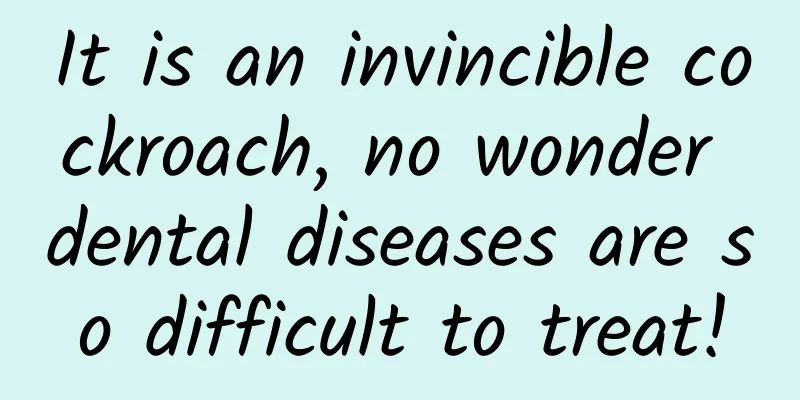It is an invincible cockroach, no wonder dental diseases are so difficult to treat!

|
Tooth decay, red and swollen gums, bleeding, bad breath, these seemingly unrelated oral problems are actually related to something in our mouths, which is dental plaque. The so-called dental plaque is a thin film-like structure formed by various bacteria, so dental plaque can also be called oral biofilm. But such an unprepossessing thing is the decisive factor for many oral diseases. The power of dental plaque should not be underestimated. The "Xiao Qiang" in the mouth Dental plaque is an organized community composed of various bacteria and has been identified as a virulence factor in many oral infectious diseases such as caries, gingivitis, periodontitis, periapical periodontitis and peri-implantitis. Bacteria in dental plaque are embedded in an extracellular polysaccharide (EPS) matrix formed by themselves, which increases their resistance to antimicrobial drugs and their toxicity compared to planktonic bacteria. Antimicrobial drugs are ineffective against dental plaque because, on the one hand, due to the complexity of the oral environment (which can be affected by diet) and the rapid removal effect of saliva (i.e., flushing effect), topical antimicrobial drugs cannot be retained at an appropriate concentration for a long enough time; on the other hand, compared with planktonic bacteria, bacteria in mature dental plaque often require higher concentrations of antimicrobial agents to be completely eliminated. When encountering antimicrobial drugs, planktonic bacteria not only have to fight alone, but also have to face full doses of antimicrobial drugs; while bacteria deep in dental plaque are effectively protected because the surrounding EPS matrix can reduce the entry of drugs. Recent studies have shown that the EPS matrix can not only provide a place for biofilm growth and maturation (scaffold function), but also provide new characteristics for dental plaque bacteria, such as surface adhesion, spatial and chemical heterogeneity, synergistic/competitive effects, and increased tolerance to antimicrobial drugs. Compared with floating bacteria, it is no exaggeration to say that dental plaque bacteria are invincible. This is one of the reasons why oral diseases such as tooth decay and periodontitis are very stubborn, although they are usually not fatal. When fighting dental plaque, professional doctors will never use antibiotics first. The combined state of dental plaque bacteria (Source: Coaggregation: Interactions between Bacteria in Dental Biofilms (hypertextbookshop.com)) What are the ways we can fight against dental plaque? 1 Traditional method There are two main types of classical methods: mechanical and chemical. The so-called mechanical method is to use mechanical force (friction, etc.) to remove dental plaque and bacteria. Specifically, it is the commonly used methods of brushing teeth and using dental floss, water flossers, interdental brushes, etc., as well as ultrasonic cleaning and manual scaling used by professional doctors. The chemical method mainly uses various mouthwashes. Although both methods are commonly used, as mentioned earlier, mechanical methods are usually the main method given the strong drug resistance of dental plaque bacteria. Among mechanical methods, brushing and flossing are not interchangeable, and there is no difference between the two because they are responsible for cleaning different areas. Brushing and flossing are the most basic dental care methods. Do not think that flossing is dispensable just because you think it is troublesome. Image source: Curved Toothpick Ended Dental Floss Picks - Goodao Technology Co., Ltd. (chinaflosspick.com) Compared with brushing and flossing, using an oral irrigator is relatively simple to operate and feels more comfortable (just like doing a spa), but its cleaning power is weaker and it is more like a deep mouthwash, so it should be used as an auxiliary method. Relying entirely on an oral irrigator to clean your teeth is actually putting the cart before the horse. More importantly, although the water flosser is also known as water dental floss, it is not as effective as dental floss for the parts of the teeth that are in close contact with each other. After all, the water flosser that can produce water flow that breaks through the contact area of the teeth is almost as effective as a high-pressure water gun. The red part is the tooth contact area (Source: Professional Textbook), which is the area that neither toothbrushes nor water flossers can reach. Although interdental brushes are easier to hold than dental floss and have better cleaning power, they are too large and are only suitable for people with abnormal gaps between teeth (sparse teeth). Image source: TePe Interdental Brushes Green Original - ISO size 5 | TePe UK 2 New attempts Recent studies have found that arginine, nanomaterials, quaternary ammonium salts, small molecules and natural products can destroy dental plaque or inhibit the formation of dental plaque. Among them, arginine is the main ingredient of amino acid toothpaste. Arginine can reduce the biomass of dental plaque, especially by reducing the production of water-insoluble EPS matrix to inhibit the formation of mutans biofilm. In addition, arginine can serve as a substrate for oral bacteria to produce alkaline substances, thus preventing dental caries by acting as a plaque ecological regulator. In the future, research on dental plaque control methods will focus more on the accuracy, effectiveness and efficiency of targeted regulation of dental plaque. |
<<: Why use artificial intelligence? Is artificial intelligence good or bad?
>>: How was the express package found to be positive two weeks later? More details →
Recommend
How to distinguish the gender of the baby in the early stages of pregnancy
Many expectant mothers, pregnant fathers and even...
What to do if you don’t have enough milk after childbirth? Traditional Chinese medicine has a great solution!
Nowadays, the incidence of insufficient milk in n...
The effects and uses of metronidazole tablets in gynecology
Key reminder: Ornidazole is an antiparasitic and ...
What is the reason for a pimple on the genitals?
Generally speaking, women are very concerned abou...
What is foamy leucorrhea?
Normal leucorrhea not only has no peculiar smell ...
Some private data about Chinese men and women...
- End of this issue -...
As Chinese people, do our breast milk ingredients have the same composition?
Today we are going to talk about a rather special...
How long does it usually take for nausea and vomiting to occur during pregnancy?
Many women will experience nausea and vomiting af...
The reason why leucorrhea is watery
If the leucorrhea is watery, there are actually m...
How to choose a walking aid that suits you?
Compared with crutches, walkers have a more compl...
What does it mean when a pregnant woman dreams of fish?
Every New Year, there is one dish that is inevita...
What is the best age for women to take fish oil
Fish oil is a general term for fish oils. It is v...
How to feel the fetus at 14 weeks of pregnancy
When you are 13 weeks pregnant, your baby already...
What is brown leucorrhea?
The main abnormalities of leucorrhea in women are...









